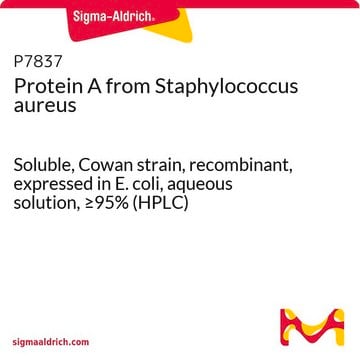D219
Monoclonal Anti-Dihydropyridine Receptor (α2 Subunit) antibody produced in mouse
clone 20A, ascites fluid, buffered aqueous solution
Synonyme(s) :
Anti-CACNA2, Anti-CACNL2A, Anti-CCHL2A, Anti-LINC01112, Anti-lncRNA-N3
About This Item
Produits recommandés
Source biologique
mouse
Niveau de qualité
Conjugué
unconjugated
Forme d'anticorps
ascites fluid
Type de produit anticorps
primary antibodies
Clone
20A, monoclonal
Forme
buffered aqueous solution
Poids mol.
antigen 143 kDa (reduced)
antigen 220 kDa (non-reduced)
Espèces réactives
rat, mouse, rabbit, guinea pig
Technique(s)
immunohistochemistry (frozen sections): 1:500
western blot: 1:500
Isotype
IgG2a
Numéro d'accès UniProt
Conditions d'expédition
dry ice
Température de stockage
−20°C
Modification post-traductionnelle de la cible
unmodified
Informations sur le gène
mouse ... Cacna2d1(12293)
rat ... Cacna2d1(25399)
Description générale
Spécificité
Immunogène
Application
Western Blotting (1 paper)
- immunofluorescent histochemistry
- surface plasmon resonance binding
- immunohistochemistry (IHC)
- immunoblotting
Actions biochimiques/physiologiques
Forme physique
Autres remarques
Clause de non-responsabilité
Vous ne trouvez pas le bon produit ?
Essayez notre Outil de sélection de produits.
Code de la classe de stockage
10 - Combustible liquids
Classe de danger pour l'eau (WGK)
nwg
Point d'éclair (°F)
Not applicable
Point d'éclair (°C)
Not applicable
Équipement de protection individuelle
Eyeshields, Gloves, multi-purpose combination respirator cartridge (US)
Certificats d'analyse (COA)
Recherchez un Certificats d'analyse (COA) en saisissant le numéro de lot du produit. Les numéros de lot figurent sur l'étiquette du produit après les mots "Lot" ou "Batch".
Déjà en possession de ce produit ?
Retrouvez la documentation relative aux produits que vous avez récemment achetés dans la Bibliothèque de documents.
Notre équipe de scientifiques dispose d'une expérience dans tous les secteurs de la recherche, notamment en sciences de la vie, science des matériaux, synthèse chimique, chromatographie, analyse et dans de nombreux autres domaines..
Contacter notre Service technique







